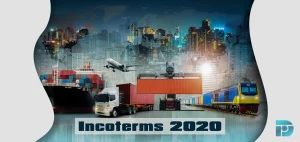Business terms are specific words or phrases that are commonly used in the fields of commerce, trade, and business. These terms may include financial and economic terms, management concepts, marketing jargon, and other expressions relevant to the business environment.
If you have specific business terms or concepts you would like more information about, please feel free to provide more details, and I’ll do my best to assist you.

Business Terms in Commercial Documents
The airway bill (AWB), a non-negotiable document issued by the airline or consolidator, functions as a receipt for the shipper, indicating the carrier’s acceptance of listed goods. It serves as evidence for the contract of carriage, freight bills, insurance certificates, and customs declarations. The AWB guides carrier staff in handling shipments. The carrier, as per the AWB, reserves the right to transport the entire consignment and may transfer it to other carriers or trucks it, if it is beneficial. Notably, the AWB is non-negotiable and cannot be used for collection. Shipments against drafts should be consigned to a local bank in the consignee’s city for notification. It’s recommended to verify with the carrier about insurance coverage, as not all carriers may provide this service.
Many foreign firms request this document to safeguard themselves in quality and conformity disputes with the shipper. Usually presented as an affidavit from either the shipper or an independent inspection firm, this document certifies the quality, quantity, and conformity of the goods to the Purchase Order.
A qualified insurance broker issues a Certificate of Insurance on behalf of the shipper. The shipper provides this document and/or instructions referenced in the letter of credit whenever Letter of Credit or Documentary procedures require him to provide evidence of risk coverage for merchandise shipped. Most freight forwarders have a blanket policy available and can issue the certificate on behalf of customers.
This document certifies that goods were manufactured in the United States. The shipper must sign the certificate, and when required, an accredited chamber of commerce or trade bureau must certify it. Then, an accredited chamber of commerce or trade bureau must certify it. Sometimes it must also be sent to a consulate for endorsement. This document must be signed by the exporter (or his representative such as a forwarder), notarized and then signed by a chamber of commerce before presenting it to the consul. A phytosanitary certificate (discussed below) can serve as a certificate of origin.
Foreign buyers occasionally require this document for control purposes. Exporters can use a certified copy of the Packing List to fill this request. An export inspection company can certify the Packing List.
Normally, exporters use the same invoice for both domestic and international trade. However, some countries require special forms. The invoice must include the dates of billing and shipping, names of exporter or manufacturer, consignee, terms of sale, mode of payment, description of goods, packing marks and numbers, numbers of units, price per unit, total price, transportation mode and any other information required by the country of destination.
This document covers all the usual details of a commercial invoice and packing list is written in the language of the foreign country for which goods are destined. Special forms are obtainable from the consulate. Consular fees are payable to the consulate certifying and legalizing the documents. (Note: It is suggested that the sales contract show consular fees and other costs such as messenger fees as the responsibility of the buyer to prevent misunderstanding or argument). In dealing with consular documents, keep in mind that these are very technical documents. Their preparation should be completed by experienced personnel such as forwarders.
Most countries have requirements pertaining to commercial invoices such as the language used, what information is shown, legalization, etc. Still others (particularly Latin American countries) require a consular invoice in addition to the commercial invoice.
This document is presented to the consul for legalization to ensure that the items being shipped are in accordance with existing import regulations of the receiving country. In attempting to enforce accuracy, consulate employees may go to extremes to see that the form is executed correctly. If a consulate overlooks an error and customs officials at the destination detect it, the buyer is likely to encounter delays and/or fines.
This document contains the same information as the short-form intermodal bill of lading, and is sent to the carrier, who acknowledges the shipper’s booking of space for the cargo described in the document.
The forwarder generally pays all third party charges such as inland freight, port charges, insurance, air/ocean freight, consular charges, messenger fees, etc., and bills the shipper for all of these charges under one invoice, the “Forwarder’s Invoice.” Supporting documents back up this invoice.
Importer’s bank issues this financial instrument to the supplier. In this document, the opening bank substitutes its own credit for that of the importer and undertakes a commitment to a designated beneficiary (the exporter) to pay a stated amount within a stated time frame. The exporter must comply with all of the terms and conditions of the Letter of Credit for the provision mentioned above to hold.
International shipments usually require copies of documents be sent to various parties such as the consignee, overseas agent, shipper, etc., and this is normally accomplished through a letter of distribution which shows who is to receive which documents.
Exporters use this form to claim insurance compensation for goods lost or damaged during exportation. The claim must fully describe lost items and supporting documents, such as copies of the Commercial Invoice, Bill of Lading and Insurance Certificate.
If buyer intends to pay for goods prior to shipment, a lengthy lead time exists. If the buyer does not want to tie up funds in advance, he may require the seller to prepare a certificate stating that the goods ordered have been produced in accordance with the contract. Upon receipt of this document, the buyer will forward payment and shipping instructions to the seller.
The ocean bill of lading serves as a document of title, a contract of carriage between the steamship company and the shipper and a receipt for goods given by the steamship company to the shipper. The bill of lading confirms where to deliver the goods, how freight charges will be paid and to whom the goods are consigned. The bill of lading spells out all legal responsibilities and liability limits for all parties to the shipment. Since an original bill of lading is a negotiable instrument (copies are not), the shipper/exporter may want to prepare it in such a way that he can retain title to the goods. In addition, the shipper/exporter should find out whether the destination country requires specific wording on the OB/L before filling it out.
Two types of bills of lading exist. The shipper uses the first type, non- negotiable ”straight bills,” when consigning the shipment directly to the final buyer. Meanwhile, the shipper uses the second type, negotiable “order bills,” when he does not want title to pass to the buyer until certain conditions have been met. In this instance, the specified shipper must endorse bill of lading before delivery can occur. An order bill of lading must also show the party to be notified at destination.
Order bills of lading play a important part in international transactions, especially when dealing with letters of credit and drafts. Most letters of credit call for “on board” bills of lading, which provide proof to the buyer that the shipment has been placed on board the vessel.
Customs officials use this list to check cargo; while, buyers use it to inventory merchandise received. The packing list describes all items in the box, crate, pallet, or container, plus the type, dimensions, and weight of the container.
Most countries require that a phytosanitary certificate accompany shipments of raw fruits, vegetables, and plants. The document certifies the product to be free from quarantine pests and significantly free from injurious pests, which could damage crops. In addition, treatments such as fumigation or cold storage, required by the importing country, or which are necessary to meet pest free standards, are supervised by the certifying official and documented on the certificate.
Exporters, packers or shippers, and other parties involved in the transaction may request phytosanitary certificates. As a matter of convenience and efficiency, phytosanitary inspections are usually carried out at shipping point, often as the product is being graded and packed.
It is the responsibility of the exporter to ensure that an English copy of the import permit (if required) is furnished to the certifying official so that she may ensure that conditions are met. In addition, the inspector must have the destination, name and address of the foreign consignee, manifest of the load, etc. Without this required information, the inspection cannot be performed and the certificate will not be issued.
Phytosanitary certificates are provided through the USDA’s Animal Plant Health Inspection Service (APHIS) and similar state agencies. The state and federal certificates serve the same purpose and the choice is a matter of preference for the parties involved. The phytosanitary inspection is unrelated to quality, grades, and classifications.
Exporters give Freight Forwarders and Customs Brokers the right to act as their agent with this document.
The buyer uses this document when he applies for importation, and if required, for a letter of credit. Therefore, it is important that the invoice include all the necessary information for an import application,
that it reflects your product in a very precise manner and that it includes every conceivable cost you might have to bear.
In order to create a pro forma invoice, you need to know:
1. Equipment/items that the customer desires, and its value, weight, and dimensions of the shipment, cubic dimension.
By what means the equipment is going to be shipped. Your forwarder will help you determine the charges for the freight, insurance premium charges, legalization charges (depending upon the country), and the cost for handling the letter of credit. If inland transportation is involved, he can figure those rates as well.
Packing method: crates, pallets, or containers.
4. Where the equipment will be landed.
A sample performa invoice should have the following Spcs:
P/I date
P/I validity
Buyer’s name and address Seller’s name and address Specification of goods Quality standard if any Quantity
Tariff no.
Packing instruction
Marking
Tolerance
Origin
Terms of delivery
Delivery date
Means of transportation
Shipment /partial shipment/trans shipment allowed /not allowed L/C validity date
Unit price
Total price
Terms of payment
Inspection /surveillance charges
Net weight net/ gross. Dimension, size
International Air Transport Association and International Maritime Organization regulations require shippers to declare dangerous cargoes to their air and ocean carriers.
IATA and IMO use separate documents, which they publish in their respective codes.
The number of documents the exporter must deal with varies depending on the destination of the shipment. Because every country has different import regulations, the exporter must be careful to provide proper documentation. If your company does not rely on the services of a freight forwarder, the following are methods of obtaining information on foreign import restrictions:
Basics of Exporting – Business Travel Abroad
By traveling abroad, you can locate and cultivate new customers while improving relationships and communication with your current foreign representatives and associates. Like domestic business, face-to-face meetings with a client or customer is the best form of business contact. As you plan your trip, be aware of the various business customs, travel conditions, entrance requirements, cultural environments, and … in the country of destination.
Business Meetings
workdays, including foreign holidays, and business hours in the countries to be visited. For instance, in many Middle Eastern countries the workweek typically runs from Saturday to Thursday. In many Latin American countries, lengthy lunch hours, or “siestas,” are customary.
Business language is generally more technical than conversational speech and misunderstandings can be costly. Before leaving the home country, you should know whether the individuals with whom you are planning to meet are comfortable speaking English. If not, arrange to have professional interpreters at your meetings. Also, you should carry business cards printed in English and in the language of the country visited, since exchanging business cards when first meeting someone is considered a basic part of proper business etiquette in some countries. Some international airlines can arrange this service.
Cultural Considerations
Business executives traveling abroad should learn about the history, culture, and customs of the countries to be visited. Business manners and methods, religious customs, dietary practices, humor and acceptable dress all vary greatly from country to country. Although you need not completely adopt business procedures of the countries you visit; flexibility, cultural sensitivity, and adoption should be guiding principles when traveling abroad and conducting international business.
Entrance Requirements and Visas
For example, a passport containing an Israeli visa may prevent visits to certain other countries in the Middle East. You should obtain the necessary travel documents two or three months before departure, especially if visas are required. A travel agent can help make these arrangements.
Requirements for certain vaccinations differ from country to country. A travel agent, airline, or doctor can advise you on the various requirements.
International commercial terms ( INCOTERMS ) clarify the rules and terms that buyers and sellers use in international and domestic trade contracts and it is updated once every 10 years.
A representative is a person who has been chosen to act or make decisions on behalf of another person or Company.
A business representative works in the sales department of a company over sea. Their duties often include meeting with existing clients to provide customer service or seeking out new clients on behalf of the company in another city or country . Additional responsibilities may consist of processing international payments.





